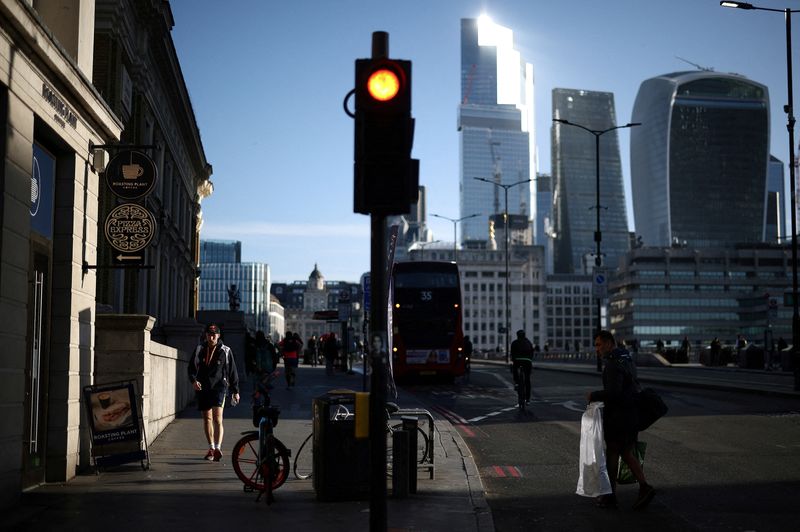By Naomi Rovnick and Chiara Elisei
LONDON (Reuters) – Direct lending, a key but expensive source of credit for riskier European firms that banks often shy away from, is running out of steam, a fresh sign that aggressive interest rate rises may be starting to cause funding stress and exacerbate economic pain.
Fundraising and deal-making have dropped sharply at European private debt funds, new data shows.
The European private credit industry, which flourished after the 2008 financial crisis as capital-constrained banks cut lending, has raised 26.1 billion euros ($28.02 billion) of new investment so far in 2023, according to data provider Preqin.
That represents a 34% drop on the same period last year and follows a record 2022 for capital raised by the sector.
Private lending is declining as euro zone banks cut loan creation and business activity falters.
The M3 broad measure of euro zone money supply declined in July for the first time since 2010. The Bank of England is concerned about a funding squeeze in non-bank lending.
“We think that in the next two quarters, financial conditions will deteriorate meaningfully,” said Francesco Sandrini, head of multi-asset strategies at Amundi, Europe’s largest asset manager.
The European Central Bank has delivered 425 basis points (bps) of tightening this economic cycle and the BoE more than 500 bps. Now, those moves are beginning to bite.
Direct lenders, which overwhelmingly fund private equity-backed and mid-market businesses, closed just 111 transactions in the second quarter of 2023, new data from Deloitte shows, down 48% from the same quarter last year and the lowest since Q3 2020.
Deloitte corporate finance debt advisory director Andrew Cruickshank described private financing as now “tougher to arrange”, a likely indication of pain ahead for business owners wishing to borrow and leveraged companies seeking to replace maturing loans.
Deals are “taking longer than they have traditionally”, he said, adding Deloitte was seeing an “uptick” in private lenders demanding debt-for-equity swaps, the practice of taking ownership of a business when borrowers struggle to repay debt.
Private loans could pick up later in the year, Cruickshank said, but were unlikely to reach levels that would “reverse what has been a poor year to date”.
DEFAULTS
The lending squeeze reinforces expectations that corporate defaults will rise. Fitch Ratings sees a default rate on leveraged loans of 8.5% by the end of 2024, up from 1.7% in July.
Private debt funds charge borrowers a hefty premium above benchmark euro zone lending rates, with yields now exceeding 12%, Pictet says.
Patrick Marshall, head of fixed income for private markets at Federated Hermes, anticipates tighter liquidity ahead.
“You will see lenders in certain sectors of the industry dealing with their own portfolio issues,” instead of making fresh loans, he said.
European companies backed by private capital are now spending around 36% of their earnings before interest and tax on debt payments, up from 23% in 2021, Fidelity International estimates.
Faisal Ramzan, a partner at law firm Proskauer Rose who advises private credit funds, said he was not seeing default. But, he added, in the past “three or four months” lenders were starting to “get closer” to companies with weakening prospects to “try and head off anything that’s coming down the line”.
DRY POWDER
Private credit fund managers express caution about deploying funds in their 300 billion euro market.
“There’s plenty of dry powder,” said Fidelity International’s head of private credit strategies Michael Curtis, referring to capital raised already. “It’s more a question, for us, of finding the right deals to do.”
Joanna Layton, managing director of European private credit at Alcentra, one of Europe’s largest private debt managers, added there was “no rush” to deploy capital.
This year so far, she said, was marked by direct lenders “all being quite cautious”.
HIGH-RATES TEST
Some industry insiders noted Europe’s private lending market has not lived through a high interest rate environment.
Mark Brenke, a 20-year veteran of private funding markets and head of private credit at $150 billion asset manager Ardian, said most European direct lenders “will only have a track record going back to 2012 or 2014”.
Euro zone and UK rates are running at 23- and 15-year highs, respectively.
High rates have also made private credit less appealing to institutional investors, analysts said.
When 10-year Treasury yields ran below 1% in 2020 and below 2% in early 2022, pension funds and insurers used private credit to create extra income, said Chris Sier, chief executive of asset management consultancy ClearGlass Analytics.
But with institutions now earning north of 4% on Treasuries, Sier said, “they need less of this risky asset class and that is a reason certainly not to buy any more.”
($1 = 0.9314 euros)
(Editing by Dhara Ranasinghe and Catherine Evans)
